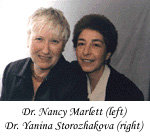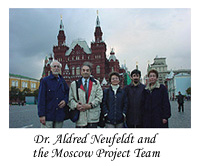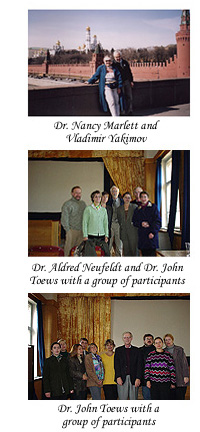|


SECOND PROJECT
Title: Russia Mental Health System Reform
(April 2000 - June 2002)
Project Purpose
The purpose of this project was to build on the successes of
the first project and respond to the Russian mental health system's
immediate need of psycho-social and related rehabilitative supports
appropriate to Russia's diverse regional contexts, and for training
in community mental health rehabilitation. There also was a need
to strengthen the fledgling self-advocacy movement.
Project Objectives
The three main objectives pursued were to:
• develop model programs and more limited pilot projects
which test and demonstrate concepts of community mental health
rehabilitation in Russia's diverse regional contexts;
• extend training in these concepts to a second cohort of
psychiatrists and other personnel from regions in the Russian
Federation not able to participate in Project I; and,
• facilitate the continued development of parent and consumer
support organizations.
Work Completed
Pilot Projects
The project tested and demonstrated innovative community mental
health rehabilitation models in a large urban setting (Moscow),
smaller urban setting (Ryazan), and eight urban and semi-rural
settings: Yekaterinburg, Tambov, Tula, Tver, Vladimir, St. Petersburg,
Novgorod, and Moscow Region. Moscow and Ryszan hosted the most
developed projects both in hospital and outpatient settings. Notable
in Moscow were the First Psychotic Episode Clinic modelled on
one in Calgary, and extensive outpatient group supports for persons
with chronic schizophrenia. Ryazan's outpatient dispensary developed
an innovative working relationship with a community social support
centre to support inclusion of people with psychiatric impairments.
Both the Ryazan dispensary and hospital developed extensive group
supports for patients.
 More
limited pilots included the following. Moscow Regional (country)
Mental Hospital #10 implemented independent living skills training
for long-term inpatient, and changed the hospital environment
to be more home-like and stimulating in preparation for discharge
of residents to the community. Independent living skills training
was also tested and utilized in Yekaterinburg. The pilot project
in St. Petersburg involved acute mental patients in different
types of group work to reduce the maladaptive influence of hospital
stay, and developed transitional forms of housing. Tambov focused
on developing a functional rehabilitation unit in the regional
mental health hospital to prepare long-term inpatients for discharge,
and developed transitional forms of housing (sheltered living
and a group home model). Tver's project was focusing on developing
rehabilitation for elderly people with psychiatric impairments.
Vladimir, Tambov and others used visual and performing arts
(e.g. painting, theater and puppetry, crafts studio) to promote
social rehabilitation and to connect people with psychiatric
impairments to the local community. More
limited pilots included the following. Moscow Regional (country)
Mental Hospital #10 implemented independent living skills training
for long-term inpatient, and changed the hospital environment
to be more home-like and stimulating in preparation for discharge
of residents to the community. Independent living skills training
was also tested and utilized in Yekaterinburg. The pilot project
in St. Petersburg involved acute mental patients in different
types of group work to reduce the maladaptive influence of hospital
stay, and developed transitional forms of housing. Tambov focused
on developing a functional rehabilitation unit in the regional
mental health hospital to prepare long-term inpatients for discharge,
and developed transitional forms of housing (sheltered living
and a group home model). Tver's project was focusing on developing
rehabilitation for elderly people with psychiatric impairments.
Vladimir, Tambov and others used visual and performing arts
(e.g. painting, theater and puppetry, crafts studio) to promote
social rehabilitation and to connect people with psychiatric
impairments to the local community.
Information gathered through this experience was summarized
and disseminated through public media (television, radio and
newspapers), presentations at conferences and publications in
professional journals. Upon completion of the local pilot projects,
it was clear that most had become sustainable and will continue
to function.
 Training
in Community Mental Health Rehabilitation Training
in Community Mental Health Rehabilitation
The training program involved a Community of Learners (COL)
of 35 participants from 24 cities and regions. Participants
had a diverse background in psychiatry, psychology and social
work. The program introduced the concepts and practices of community
mental health rehabilitation. Some of the trainees were simultaneously
involved in implementing those practices by taking an active
part in developing community mental health pilot projects in
their home facilities.
Strengthening Civil Society
Pilot projects, training and support from the Project Team
fostered development of parent and self-help groups for persons
with mental health problems. During the course of the project
the number of local consumer organizations grew from 1 to 47.
A significant outcome was to formally register the public organization
"New Choices" for people with mental disabilities
and their families as an All-Russia society. Collaboration between
mental health consumers and professionals characterized its
development, with most local groups supported by graduates of
our program.
Benefits
Benefits to the two countries include the following. In Russia:
1) Learning through the model and pilot programs created the
potential for guiding future changes in the mental health system.
2) Professionals trained through this project will become the
trainers of future personnel capable of continuing to develop
the needed resources and supports for people with chronic mental
disorders (positions for such personnel are already established,
though mostly vacant). 3) People with mental disorders and their
families benefited from newly created service models, and will
continue to benefit directly in the longer term. Canada obtained
a useful comparison into a mental health system in transition
at the same time as Canada's mental health services are being
reformed. It is conceivable that reforms introduced to the mental
health system through this project may have impacts much beyond
the immediate services. Concepts of collaborative decision making,
the role of self-advocates and families, and civil rights of
the service user, as well as the introduction of new forms of
community-based services, are likely to have a sizeable ripple
effect impacting local communities as well as other health and
social services.

More pictures from workshops with
Russian professionals.
BACK TO TOP
|